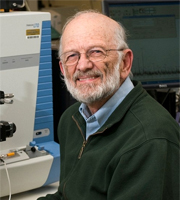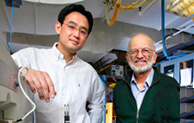Therapeutic Drug Monitoring Research
2010-03-24

Distinguished Professor, Analytical Chemistry
Mass spectrometry technology being developed at Purdue University may be the first to provide patients with real clinical benefits as a result of personalized medicine.
The Alfred Mann Institute for Biomedical Development at Purdue University (AMIPurdue) is funding a project that may improve procedures used to measure the amount of active therapeutic drugs in a person's bloodstream and enable immediate, point of care (POC) measurement of a specific active drug level.
Zheng Ouyang, assistant professor in Purdue's Weldon School of Biomedical Engineering, and R. Graham Cooks, the Henry B. Hass Distinguished Professor of Analytical Chemistry in the College of Science, have developed technologies that will increase the speed and efficiency of therapeutic drug monitoring (TDM). Traditional TDM requires collecting a sample of blood at one location and submitting it to a clinical laboratory to be processed. The technology developed by Ouyang and Cooks will make it possible to process the blood sample almost instantly in the hospital, doctor's office or clinic location where it was collected using a small "finger prick" blood sample.

The benefits of this technology range from a lower cost per test to clinical benefits that include immediate patient feedback reflecting the active level of a drug in the bloodstream.
"For instance, the active drug level for a cancer patient can be measured in real time, and medication can be used to a maximum clinically effective level with a minimum of negative side effects," Ouyang said.
Ouyang and Cooks have developed two technologies that will be paired together: a miniaturized mass spectrometer, of which several generations have been developed, and a "paper spray" ambient ionization technology.
AMIPurdue has committed $1.3 million in funding for the project over the next two years with unspecified additional funding in year three.
"The mission of the institute is to sponsor and support technologies created within the life sciences laboratories at Purdue and get worthwhile products for patients as soon as possible," said John C. Hertig, executive director of AMIPurdue. "The POC Mini-MS technology being developed by Ouyang, Cooks and their team with our support is an excellent example of why the institute was brought to Purdue.
Source: Purdue Research Park
Image caption: Dr. Zheng Ouyang (left), Dr. Cooks (right), in research lab.Image provided by the Purdue News Service